It’s a big step in the fight to preserve Indigenous languages for generations to come.
The University of British Columbia Okanagan campus, the Nicola Valley Institute of Technology and the En’owkin Centre have come together to bring the first bachelor’s degree in Indigenous language fluency to life.
“The N.V.I.T. centre and UBC have worked very hard and diligently together with the I.A.L.A. (Indigenous Adult and Higher Learning Association) institutions on programming and moving it from the original N.V.I.T. model proficiency to the immersion,” said Verna Billy-Minnabarriet with the Nicola Valley Institute of Technology.
“That’s what we are doing now for the four languages Nsyilxcn, Nedut’en, Northern St’át’imcets, Nłeʔkepmxcín, Nisga’a and SENĆOŦEN.”
The collaboration is between the two learning institutes, the Indigenous Adult and Higher Learning Association, the province and other partners, all of whom are invested in a pilot program to grow the number of fluent language speakers in B.C. through immersion learning.
Read more:
UBC Okanagan professor suggests new approach to ‘limit disparities’ in forest-water research
“Congratulations to UBCO on this historic bachelor of Nsyilxcn language fluency degree, the first of its kind in B.C.,” said Anne Kang, Minister of Advanced Education and Skills Training said in a press release.
“You have followed through on the Truth and Reconciliation Commission’s (TRC) recommendation to create university and college degree and diploma programs in Aboriginal languages. And now this pathway, starting at En’owkin Centre and NVIT and moving through to the degree at UBCO, could set the bar as a best-practice standard for developing Indigenous language fluency in the province, if not Canada.”
Read more:
UBC Okanagan drug-checking program aims to save lives during overdose crisis
The four-year Bachelor of Nsyilxcn Language Fluency (BNLF) will see students complete the first two in a certificate and diploma program in Nsyilxcn Language Fluency from NVIT and finish the last two at UBC Okanagan in the Irving K. Barber Faculty of Arts and Social Sciences. It will feature a mix of on-campus, classroom learning and practical work directly with the community, states UBC Okanagan in a press release.
“Many of the mother tongue-fluent speakers are in a number of different communities,” said Jeanette Armstrong, UBC Okanagan Indigenous Studies.
“For example, in the Okanagan there are seven communities with seven different chiefs and councils and the community-based learning is what N.V.I.T. does, they are really great at that.”
It’s not just about preserving a language, it’s about sharing a way of seeing the world.
“The language has a very different context than in English,” said Armstrong.
“When I think in my language and I see in my language, the world is actually seen very differently, the perspective is very different and I think that is a really important aspect of the Indigenous languages. For me, it’s not just a matter of emotional context.”
This fall, the first incoming class will be welcomed into a program and the creators hope will reclaim a fragment of the culture lost as a result of residential schools.
Must See
-




Entertainment
/ 3 weeks agoFaveSzn’s Revelation: Dating Choirmaster at 10 and Sexual Curiosity
Nigerian singer, Chidozie Ugochinyere, popularly known as FaveSzn, has revealed that she once dated...
By Flying Eze -






Europe
/ 3 weeks agoWhy Hungarian Prime Minister Orban visited
Two months later, the leaders of China and Hungary met again. Hungarian Prime Minister...
By Flying Eze -






News
/ 3 weeks agoThree dead and millions without power as Tropical Storm Beryl hits Texas
Man, 53, and woman, 74, killed by fallen trees and third person drowns amid...
By Flying Eze



